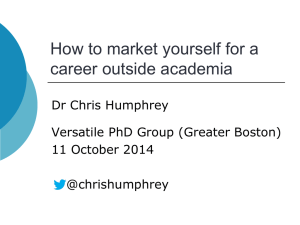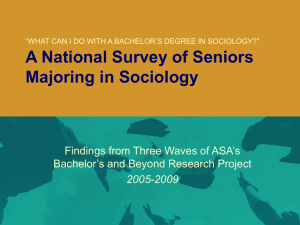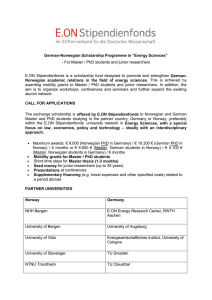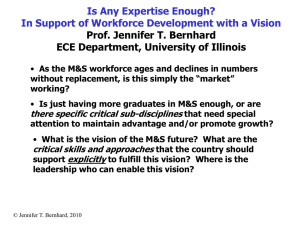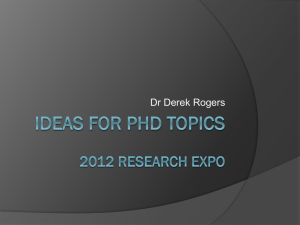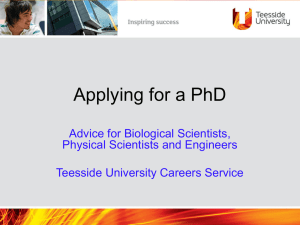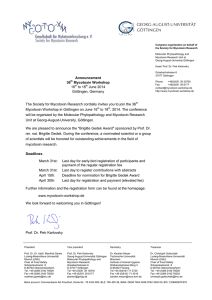MSc/PhD - The Baltic Sea Region University Network
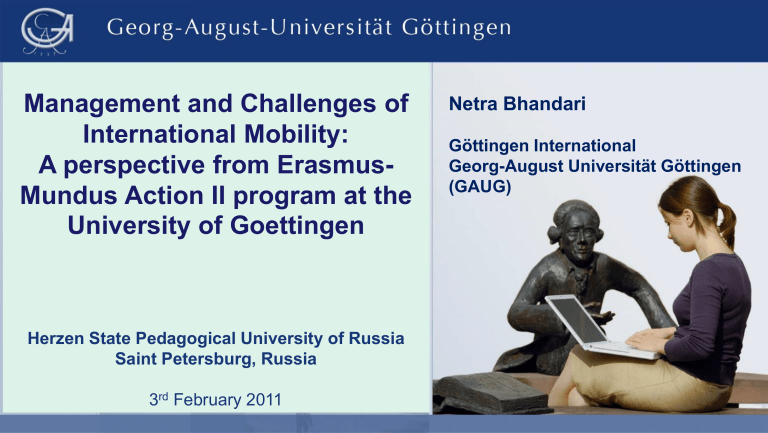
Management and Challenges of
International Mobility:
A perspective from Erasmus-
Mundus Action II program at the
University of Goettingen
Netra Bhandari
Göttingen International
GeorgAugust Universität Göttingen
(GAUG)
Herzen State Pedagogical University of Russia
Saint Petersburg, Russia
3 rd February 2011
Contents
• University of Goettingen- Introduction
• International Study Programs at
GAUG
• Degree Structure in Goettingen
• International Students Overview at
GAUG
• Erasmus Mundus Action II Projects at
GAUG (Example of EXPERTS Project)
• Services for Students and Goettingen at GAUG (Challenges)
University of Goettingen-
A Brief Introduction
Georg-AugustUniversität Göttingen, Germany
Profile
• Priority in research and research-based teaching
• Plurality of disciplines – diversity in range of programmes offered
• One of nine German universities successful in the initiative for excellence
• Rank 1 st in Germany, 9 th in Europe, 43 in the World THE- ranking
• Operated as a Foundation (Autonomy)
Strategy
• Development of Research Foci
• Alliance with non-University research institutions (ZUK)
• Internationalization
Faculties ( 13, 180 Institutes)
• Agriculture
• Biology
• Chemistry
• Economics and Business Administration
• Forestry and Forest Ecology
• Geosciences and Geography
• Law
• Theology
• Mathematics - incl. Informatics
• Medicine
• Philosophy
• Physics
• Social Sciences
Basic Data
• 24,000 Students
12 % international (new entrants: 20%)
Top 5 countries: China: 378 / Poland: 183 /
Russia: 167/ India: 79 / Ukraine: 75 /
Korea: 67
• 2850 PhD-Candidates
26% international
• 13,500 Employees (incl. Medicine)
• 420 Professors (incl. Medicine)
• 250 Guest scientists and professors
Network of Non-University Research Institutions in the Locality
• Academy of Science Göttingen
• MPI for Biophysical Chemistry
• MPI for Experimental Medicine
• MPI for Dynamics and Self-Organisation
• MPI for the Study of Religious and
Ethnic Diversity
• MPI for Solar System Research
• German Primate Centre, DPZ
• German Aerospace Centre, DLR
• Laser-Laboratorium Göttingen
International Study
Programs at GAUG
International Study Programs (Master)
158 Programs (81 Bachelor's / 77 Master‘s) and 23 PhD Programs
English Programs
- MSc/PhD Molecular Biology
- MSc/PhD / MD-PhD Neurosciences
- MSc/PhD Molecular Medicine
- MSc International Agribusiness
- MSc Mathematical Finance
- MSc Tropical & International Forestry
- MSc Hydrogeology & Environmental Geosciences
- MSc Sustainable International Agriculture
- MSc Microbiology / Biochemistry
- MSc Developmental, Neural Behavioural Biology
MA Intercultural Theology
- MA Modern Indian Development Studies
English-German Programs
- MA International Economics
- MA American Studies
- MSc Information Systems
- MSc Mathematics
Double Degree Programs
MA Euroculture
MSc International Nature Conservation
MSc Sustainable Forest & Nature Management
Graduate Schools
• Georg August University School of
Science – GAUSS (900, 360 foreign nationals)
• Graduate School of Social Sciences
Göttingen - GGG (800, 140 foreign nationals)
• Graduate School of the Humanities
Göttingen - GSGG (210, 40 foreign nationals)
• Medical School (345, 50 foreign nationals)
International Doctoral Programs at the Graduate Schools
• Biomolecules: Structures-Function-Dynamics (PhD/Dr)
• Molecular Biology of Development and Interaction between
Organisms (PhD/Dr)
• Molecular Biology (PhD)
• Neurosciences (PhD/MD-PhD)
• Molecular Biology of Microbial Animals and Plant Cells (PhD/Dr)
• Molecular Physiology of the Brain (PhD/Dr)
• Systems Neuroscience (PhD/Dr)
• Sensory and Motor Neurosciences (PhD/Dr)
• Theoretical and Computational Neuroscience (PhD/ Dr)
• Metal Sites in Biomolecules: Structures, Regulation and
Mechanism (PhD)
International Study Programs
• Molecular Medicine (PhD)
• Biological Diversity and Ecology (PhD/Dr. rer. nat.)
• Wood Biology and Technology (PhD)
• Applied Statistics and Empirical Methods (PhD/Dr)
• International Programme for Agricultural Science (PhD)
• Catalysis for Sustainable Synthesis – CaSuS (PhD)
• Computer Science (PhD)
• Environmental Informatics - PEI (PhD)
• Forest Sciences and Forest Ecology (PhD)
• School of Mathematical Sciences (PhD/Dr)
• Molecular Sciences and Biotechnology of Crops and Trees (PhD/Dr)
• Physical Processes in the Solar System and Beyond - IMP Research School (PhD)
• Physics of Biological and Complex Systems – IMP Research School (PhD)
Degree Structure in
Goettingen
Degree structure in Göttingen
• Bachelor ( 3 years ), Master ( 2 years ) → Doctorate ( 3 years )
• MSc/PhD – programme: direct access into PhD after first year of Master
Entry
(BSc)
Examinations
0
First segment
(90 Credits)
Doctoral Programme (30 Credits)
MSc
Thesis
MSc degree
1 2
Year
3
Doctoral Thesis
Thesis Defense
4
International Students
Overview at GAUG (2006-09)
Germany
China
Russland
Polen
Bulgarien
Türkei
Ukraine
Marokko
International Students Overview 2006-2010
Göttingen
China (372/36)
Polen (183/31)
Russland (167/4)
Indien (79/0)
Ukraine (75/18)
Korea (67/9)
Indonesien (60/4)
International Students Overview 2006-2010
International Students Overview 2006-2010
Example: Distribution of the students from Russia:
Bachelor: 62
Master: 25 – Diplom: 6 – Magister: 25 – Staatsexamen: 6 (including second batch total: 62)
PhD: 33
Non Degree: 4
Erasmus Mundus Action II Projects at
GAUG (Example of EXPERTS Project)
Existing Erasmus Mundus Action II projects at Göttingen
• Since 2008 partner in LOT 4 – Russia
Triple i (U of Turku as coordinator)
• Since 2009 partner in:
• LOT 13 India (KTH Stockholm as coordinator)
• LOT 14 China (U of Ghent as coordinator)
• LOT17 Brazil, Paraguay, Uruguay (USC
& U of Porto as coordinators)
• LOT 18 Agentina, Bolivia, Peru (USU as coordinator)
• Lot 5 (2009) – Russia Triple i (U of
Turku as coordinator)
Existing EMA2 projects at Göttingen
• In 2010
• EXPERTS- Lots 11 Asia Regional (GAUG as Coordinator)
• Lot 9- Central Asia (Universidad Santiago de Compostella as coordinator)
• EURASIA II- Lot 12- Asia Regional (U of
Prague as coordinator)
• LOTUS- Lot 12- Asia Regional (U of Ghent as coordinator)
• JOSYLEEN- Lot 3- Middle East (U of Lund as coordinator)
• Lot 5 (2010) Triple i - Russia (U of Turku as Coordinator)
EXPERTS – EMA2 Project in South and South East Asia
1 UT
UU 1
KLeV
USC
1
1
1 UGOE
1
MU
1
POLITO
LUMS 1
DU
PU
1
TU
1 1
KU
1
USTC
1
RUB
1
1
1 KhU
NU
1
VSU
UPA
1
IPB Bogor
1
Contents:
1. General Introduction-
EXPERTS
2. Objectives
3. EXPERTS- Workplan
4. Mobility schemes
5. Finances and administrative issues
6. Management
7. Roles
8. Consortium Agreement
9. Quality assurance
10. Application and
Selection process
11. Documents
12. Dissemination
EXPERTS- Mobility- Scheme
– How to reach the maximum high quality mobility? What are the flexibility?
–No partner based fixed quota of incoming students, project application is based on “ideal” mobility scheme- quality key criteria
• Candidates will be requested to indicate at least 3 host universities (EU HEIs)
• Final list by project coordination team
– Important: all student mobilities must start by end of December - 2011 at the latest- whereas staff mobility is flexible within the project time frame
–Target Group 3:
• How to reach?
• Definition?
Roles
– Information, brochures Web info
Handbooks etc.
– Providing academic information
– Application and admission (online application) - screening of own candidates, validation, evaluation and selection
– Pre-arrival
– Arrival
– Study start
– Candidate guidance
– Evaluation
– Degree awarding
– Meetings (kick-off meeting, evaluation meeting, selection meeting)
– Co-ordination
– Economic issues
– Feedback and consortium reports
Quality assurance
– Assess the quality in the pre-mobility, intra-mobility and post-mobility periods
Questionnaires for quality assurance:
– The Consortium coordinator will prepare online questionnaires, which must be filled in and then signed by each scholarship holders, the project's local coordinator, the contact person, the persons responsible for the mobility and returned to the Coordinating Institution for analysis.
– The Coordinator will make available a statistic analysis of the questionnaires received by the scholarship holders on the intranet of the consortium: each partner Institution will be able to access the results of the feedbacks of the scholarship holders (incoming and outgoing)
– Expected outcomes: evaluation on the quality and management of the project.
• identification of aspects to be improved by each partner and by the coordination.
• recognition of good practices to maintain and further development.
Dissemination
– Mailing Lists/Emailing
– University Website
– Newsletters
– Online portal
– Posters and flyers
– Info-seminars/Education Fairs
– Workshops
Whom to distribute: Universities, (I)NGOs, National Delegations, Embassies,
Ministries of Education, Students Association
Services for Students and
Academics
Office of Student Affairs – Team International Student Service
Responsibilities: Support for international students
Formalities (application, enrollment)
Support in finding accommodation
Counseling on financial support
Support in dealing with authorities and departments
Pick up service by student tutors
Welcome party
Excursions
Foyer International
Welcome Centre Goettingen International - Difficulties
– Many scholars do not speak German → Difficulties in understanding contracts, documents, dealing with authorities etc.
– Decentralized support by the institutes → Unequal quality of support
– Insufficient competence in English language and intercultural communication within certain central units and institutes → misunderstandings, mistakes
– Increasing demand for information, counseling and services → Expert knowledge required
– Focus mainly on academic matters → No social integration
Excellent support → Advantages in competition for the best scholars
Solution
A central unit - the Welcome Centre
– Closing organizational and institutional gaps
– Central contact point for the entire university, with expertise in all related fields:
• Service for international scholars and scientist, incl. their families, who are coming to
Göttingen
• Service for the host institutes
• Service for other central units, e.g. personnel department
• Central contact point for external partners, e.g. authorities, insurance companies, landlords
Excellent offers and intensive networking will improve the service.
Target Group
International mobile scholars and scientists (foreign nationals, German returnees from abroad):
– Newly appointed professors, junior research group leaders
– Post docs
– Visiting professors and researchers
– Some PhD-candidates (DAAD scholarship holders, Excellence research groups)
Red Carpet Services
– Giving the university a personal face
– Requirements:
• Empathy, especially cultural empathy
• Reliable first contact point
• Highest service level
– Dealing with every non-academic subject
– Individualized counseling and support
– Fast and flexible working style
– Up to date information available
Security in making the right decision to go to Göttingen.
Services I
– Information on the Internet and in printed form (German/English)
– Helpdesk (Mo-Fr 9-12), additional appointments can be arranged at any time
– Support of the scholars, who are in the deciding phase
– Support of the scholars to organize their stay in Göttingen
• Pre Arrival (Visa, finding accommodation etc.)
• During their stay
– On arrival (accompanying service to local authorities, opening a bank account, child support etc.)
– Entire time (insurance, information meetings, excursions etc.)
– At the end (evaluation, checklist, Alumni)
Services II
– Support not only for the scholars and scientists, but for the entire family
– Related fields:
• General information on education in Germany
• Childcare facilities in Göttingen
• Schools in Göttingen
• Dual Career Service
• Social integration
Generally the partner/family is involved in the decision process, their needs also require consideration.
Dual Career Service
– Support for newly appointed professors (German and international)
• Support of the partner in finding a job in Göttingen
• Childcare and schooling
• Temporary housing
Excellent support → Advantage in competition
Networking
– Within the university (faculties, personnel department, Institute German as a foreign language etc.)
– Local/regional (authorities, non-university, industry, research institutes
– National network of research advisers at the German Mobility Centre/Alexander von Humboldt-Stiftung
– EURAXESS Network (Researchers in Motion, 35 European countries)
– Südostniedersachsen Network for Dual Career
– National Dual Career Network
– American Dual Career network (Higher Education Dual Career Network-
HEDCN)
Networking is a very important factor for successful work.
Challenges
– Housing (especially for families)
– Different needs
– Child care
– Offers in English language
– Credit transfer system (compatibility)
Viele Dank
Thanks for your
attention
!
netra.bhandari@zvw.uni-goettingen.de
www.uni-goettingen.de/international_office
39 Georg-AugustUniversität Göttingen 04.07.08

